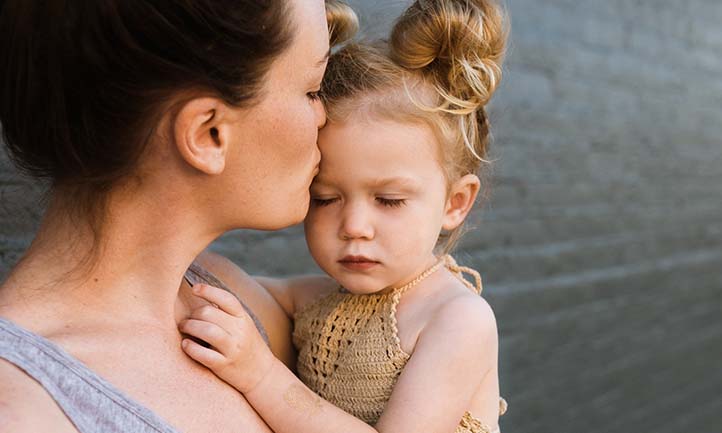Supporting Your Children During Uncertain Times
Author: Sara Firestone
Note: This article is republished with permission from the author. It originally appeared on PsychAlive.com.
With more schools and offices closing each day due to the COVID-19 pandemic, most parents are finding themselves at home with their kids around the clock. And while it is necessary for our physical health to practice social distancing or sheltering in place during this strange time, it is likely to take a toll on our mental health. No matter how much you love your children, being stuck at home with them indefinitely would be challenging even for the most patient and grounded parent.
That being said, it is unlikely most of us are going into this situation from a place of calm. The events that have unfolded over the past few weeks have been unsettling and disruptive to our daily lives. The uncertainty of this situation has aroused fear and anxiety in many of us and likely in our children as well.
The way children respond to stress can look different from adults and is dependent on many factors including a child’s temperament, available coping skills, and life experiences. Children also respond differently depending on their age or stage of development. Young children may become more cranky, throw tantrums, cry for or cling to their parents, or even return to behaviors they previously outgrew such as thumb sucking or bed wetting. Older children may shut down, become more moody, have difficulty concentrating, and become increasingly defiant or argumentative.
If you have noticed these behaviors in your children over the past few days or weeks, this could be a sign they are experiencing an increase in stress, fear, or anxiety like so many of us are.
Perhaps, the biggest influence on a child during times of increased stress or uncertainty is the behavior they are seeing modeled by the adults around them. When children see their parents or caregivers responding calmly and confidently, it helps them to feel safe and reassured.
Here are some ideas to help you take care of yourself, be a strong role model for your children, and support your family through this challenging time:
 Photo: StockSnap via Pixabay
Photo: StockSnap via Pixabay
Communicate
While communication is always important, now more than ever is the time to talk with your kids.
Talk about the facts.
It is important to let your children know the facts about what is going on and steps you are taking to keep them and your family safe. If they don’t hear it directly from you, children may begin to form an inaccurate idea of what is going on from the bits and pieces they overhear on the news or during whispered conversations. Older children may also gather information from unreliable sources such as social media or through friends. It is important to correct any misinformation your kids may have heard and let them know they can come to you with their questions. Keep in mind, how and what you decide to share will vary depending on your child’s age and should be presented in a way that is developmentally appropriate.
Talk about feelings.
It is also important to talk to your kids about how they are doing emotionally. Check in with them regularly about how they are feeling and give them space to share their emotions. Simply listening to them and validating their feelings of sadness or worry can go a long way. You can also offer reassurance by sharing the answers you do have and review the steps you are taking to stay safe. For example, remind them that for most the virus is similar to having a regular flu or emphasize the ways everyone is working together to beat the virus by staying home and spending more time with their families. Kids might also feel empowered by learning about steps they can take to protect themselves and their loved ones such as washing their hands or greeting people with elbow bumps.
Take Care of Your Mind and Body
Taking care of yourself during this time will allow you to better care for your family. Not only is it true that we are better equipped to help others when our own cup has been filled, but by taking care of yourself and effectively managing your stress you will be setting a good example for your children. While good self-care might look different from person to person, here are some good rules of thumb that should be helpful for everyone:
Stay active.
It is important to make time each day to move your body. Being physically active not only benefits your physical health, but it can also help reduce anxiety, improve your mood, and help you feel calmer. If you aren’t able to find time to work out on your own, be active together as a family. Take a walk around the block, have a dance party, or stream a free workout class together.
Stay Organized.
While it is going to take some time to adjust to this new “normal,” establishing a daily routine is one way to help you and your children make the transition to full-time life at home. Having a daily schedule can help to provide a sense of safety for children during times of uncertainty and can help to reduce their anxiety. It is also a good way to break up the day and make time for school, work, play, and self-care. Keeping the house clean and organized may also help reduce stress and make your home feel more inviting. You can involve your kids in this process as a part of your daily routine.
Stay Present.
The ability to stay present may be one of the most effective tools you can use to get through this difficult period. It is important to take each day as it comes. If you begin thinking ahead or trying to plan for the future, you may feel even more overwhelmed. Try to use this time as an opportunity to live in the moment and be truly present with your family. There is no need to rush anything. You don’t need to stick strictly to your routine. If you get caught up enjoying an activity together, there is no reason to quickly wrap up and move onto the next thing. This is a unique opportunity to connect with your kids and be in the moment with them. If this is challenging for you, practicing mindfulness is a great way to learn to be more present.
Stay Connected.
It is important for you and your family not only to take this time to connect with each other but also with friends and family who you are no longer seeing. This is going to be important for you and your kids. Make time to talk with friends or family each day over the phone or video chat with them via FaceTime or Zoom. You can encourage your kids to do the same or, if they are younger, you can help them schedule virtual playdates with their friends. Humans are social creatures and thrive when they are able to maintain active social lives. For kids, socializing with friends is an important part of their development and for parents their social connections are a valuable source of strength and support. Keeping these outside connections are important for everyone in the family.
 Photo: Harald Lepisk via Pixabay
Photo: Harald Lepisk via Pixabay
Practice Self-Compassion
Perhaps the most valuable thing you can do for yourself and your family at this time is to practice self-compassion. Self-compassion has three components:
- Self-kindness, or refraining from self-criticism
- Recognizing our common humanity, the fact that all people are imperfect and experience pain
- Being mindful of our thoughts and feelings
I cannot think of a more appropriate time for this practice, as we are currently navigating a scary, global pandemic. We have never had to do this before and are learning as we go. Most importantly, we are all in this together.
So, be kind to yourself and your loved ones. Recognize that you are all battling new territory and are likely experiencing many of the same emotions. Take each day and each moment as it comes. Allow your thoughts and feelings to come and go.
Some days might feel easier than others. Some days you may be able to follow your schedule and get a lot done. Others you and your family might stay in PJs all day watching TV. And anything and everything in between is okay. Parenting is hard enough without also battling a global pandemic. So, give yourself a break. We are all just doing the best we can.
The good news is: Kids are resilient! Even if they are showing some signs of distress now, most children fully recover from times of stress on their own. And by taking care of yourself, practicing self-compassion, and communicating with your kids, you will be modeling and teaching them effective and healthy ways to cope with and overcome this challenging time and any future challenges they may face.
Sara Firestone is an Associate Marriage and Family Therapist working in private practice in Santa Barbara, California.
